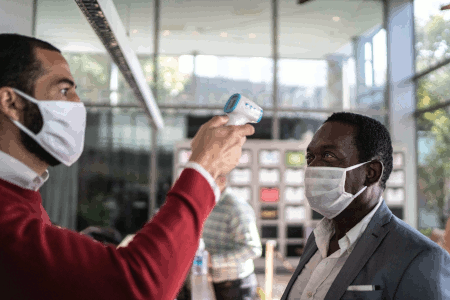Related Posts



You are about to leave Risk Strategies website and view the content of an external website.
You are leaving risk-strategies.com
By accessing this link, you will be leaving Risk Strategies website and entering a website hosted by another party. Please be advised that you will no longer be subject to, or under the protection of, the privacy and security policies of Risk Strategies website. We encourage you to read and evaluate the privacy and security policies of the site you are entering, which may be different than those of Risk Strategies.


On July 27, 2021, the United States’ Centers for Disease Control and Prevention (CDC) issued new guidance that encourages some vaccinated Americans to wear masks again during the ongoing COVID-19 pandemic. For many employers, this announcement could be viewed as another issue they must address as they seek to safely welcome more employees back to the office.
To help our clients deal with the many challenges they are facing in these unique times, we recently held a webinar titled “COVID Concerns: Vaccines, Masks and Return to Work Returning to Work in the Age of COVID-19.” The event featured guest speakers from Ogletree Deakins, a national law firm that provides labor and employment counsel to many organizations.
Below is a brief overview of the insights shared during this timely webinar:
Litigation Trends:
Ogletree Deakins has been maintaining a map highlighting COVID-19 connected lawsuits being filed across the country (click here to view the “Interactive COVID-19 Litigation Tracker”). Some of these lawsuits are directly associated with employers that are pushing the boundaries of what’s perceived to be acceptable to their workforce during the pandemic.
Webinar speakers said the trend they are seeing of employees being willing to take their employer to court over issues and concerns regarding their health and safety, was showing no sign of slowing down any time soon. The guidance provided by the speakers to employers, therefore, primarily centered around establishing clear protocols regarding any return-to-work efforts.
Return-to-Work Protocols:
There are many decisions employers need to make as they set up protocols regarding masks and other safety measures. From a legal perspective, the webinar reminded private employers they have the authority to set rules regarding what is required on their premises. (Of course, their decisions may also have a PR impact, whether with customers and/or employees.) Many employers are debating taking routes such as the following:
Requiring all visitors, customers, and employees to wear masks
Requiring only non-vaccinated individuals to wear masks
Continuing safety protocols such as maintaining social distancing
However, the key takeaway provided during the webinar was that employers must take a consistent approach to whatever they decide to do. If they are selectively enforcing protocols, they are opening themselves to more difficulties and challenges down the road.
Vaccination Issues:
The attorney speaking during this portion of the webinar said that without a doubt, the most common question he is getting right now from employers is: “Can we have a policy that says you are required as a condition of employment to get the vaccine?” There was a lot of information sharing during this portion of the webinar to try to address that question. Some of the key considerations included:
States may be the wildcard for many employers: Several states are trying to pass legislation that would limit what employers can do based on an employee’s vaccination status. Employers must continue to monitor further developments in this area.
Accommodations: Employers must be prepared to handle situations where someone asks for an exception to the policies that have been put in place. The two primary causes for exception requests that have a legal basis may be based on disability or religion. The attorney speaking during the webinar went into detail regarding the variety of considerations employers must keep in mind as they face these scenarios. But the bottom-line is employers must be prepared to offer appropriate accommodations depending on the situation.
Record-keeping: Employers must ensure they keep all medical information associated with employees separate from their personnel files.
We are grateful to our compliance partners at Ogletree Deakins for sharing their insight during this webinar. Their engaging and informative presentation delivered important insights to our clients during these difficult times. We hope you find this brief overview of what was discussed helpful.
Please note that the Risk Strategies team is here to help. Reach out to a representative today to find out how we can help you successfully navigate the HR and benefit challenges you may face as more employees return to the office.
This is not intended to be exhaustive nor should any discussion or opinions be construed as legal or tax advice. Readers should contact their legal counsel and/or tax advisor for guidance.
The contents of this article are for general informational purposes only and Risk Strategies Company makes no representation or warranty of any kind, express or implied, regarding the accuracy or completeness of any information contained herein. Any recommendations contained herein are intended to provide insight based on currently available information for consideration and should be vetted against applicable legal and business needs before application to a specific client.


